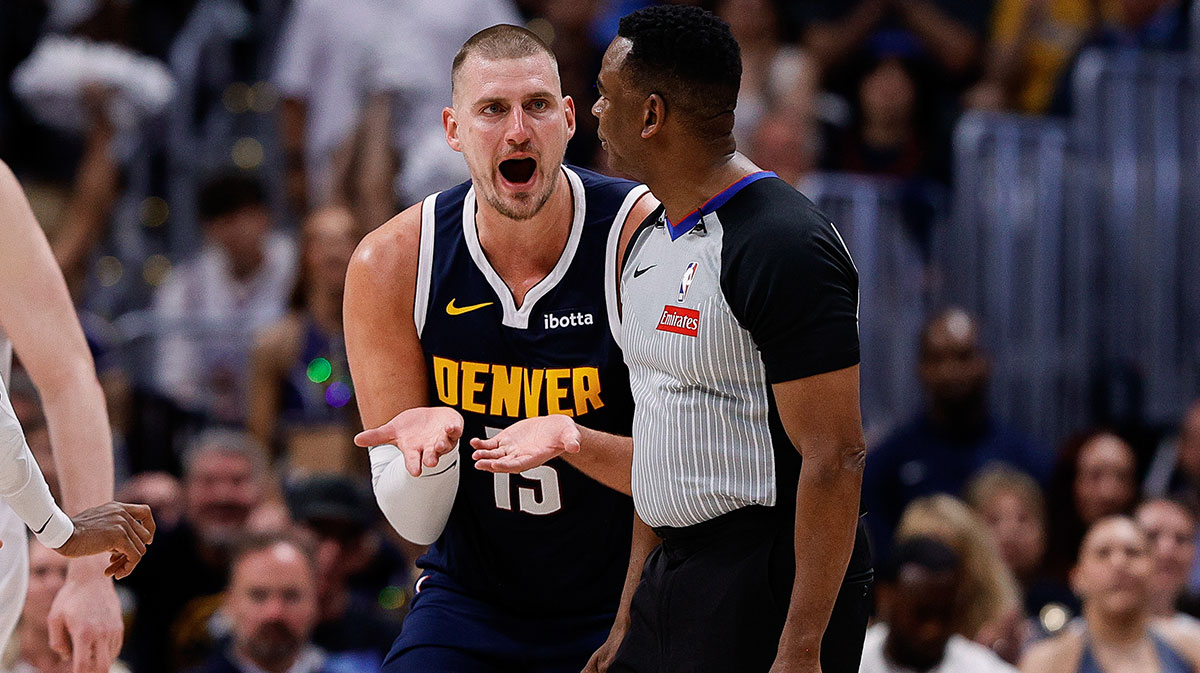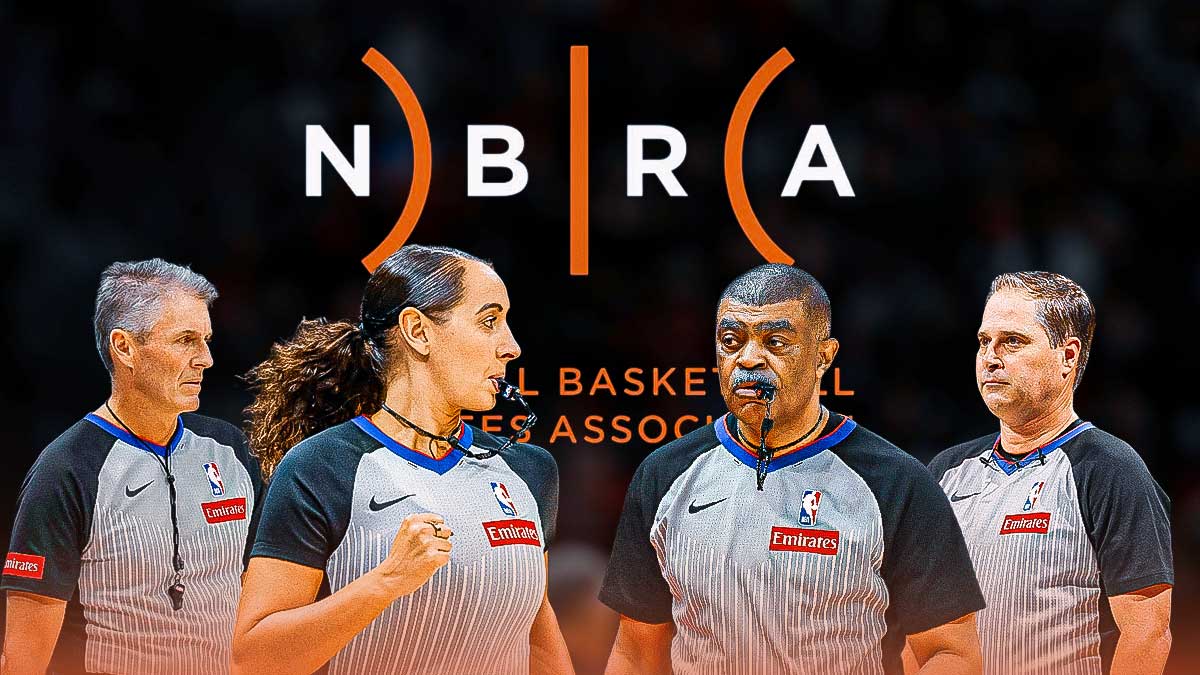Amid the relentless intensity of NBA games, where razor-thin margins and heated rivalries amplify every whistle, accountability stands as the unsung hero of top-tier refereeing. It is an undeniable necessity as few roles face more scrutiny than the game’s officials. Every decision is dissected in real-time by thousands in attendance and millions watching at home. This intense spotlight has become part of the job description, and according to Monty McCutchen (Vice President and Head of Referee Development and Training), that’s exactly how it should be.
NBA referees are more than rule enforcers; they are stewards of the game, tasked with creating a level playing field for the world’s best hoopers. McCutchen emphasized this repeatedly in a long, fun chat with ClutchPoints during the NBRA’s preseason scrum.
“Referees serve the game to create an environment where other people’s talents can shine,” McCutchen stressed. “We can only do that if we’re appropriately held accountable. Now inappropriate accountability, we have to be trained well enough to treat that as outside noise.”
This mindset transforms accountability from a defensive posture into a proactive tool. NBA and WNBA referees undergo rigorous training to handle scrutiny, filtering out “outside noise” while internalizing valid feedback. For players and coaches, this means officials who are resilient yet responsive, owning errors without deflection. When referees accept this mission and management provides proper support, accountability becomes not a burden but a necessary tool for improvement.
As McCutchen notes, imperfections are not excuses but opportunities.
“Part of our job in management is to recognize what is constructive criticism that is valid and that we need to grow in, and what is outside noise that should be separated,” quipped McCutchen. “The wheat and the chaff have to be separated to get to the good stuff. That’s our role.”
This separation ensures that feedback from players and coaches, which is often delivered in the heat of the moment, translates into tangible improvements. Management facilitates post-game analyses and rule clarifications, turning potential conflicts into collaborative advancements. The result? A sharper officiating crew that minimizes errors and ensures that referee development is driven by substantive analysis.
Around 96% of the whistled calls last season were correct after all. McCutchen’s crew looked at almost 750,000 decisions last season to make sure.
NBA, WNBA focused on fans Isaiah J. Downing-Imagn Images
Isaiah J. Downing-Imagn Images
In an era of instant social media reactions and hot-take culture, NBA and WNBA officials face a constant barrage of commentary. Some of that fussing is informed, much of it emotional. Training referees to distinguish between legitimate feedback rooted in rules knowledge and criticism driven purely by partisan fandom becomes essential to their development and mental well-being.
Monty McCutchen does not view fan criticism as something to be dismissed or feared. Instead, he sees engaged fans as potential partners in accountability. There is more respect for everyone involved when the fans better understand the rules and training officials undergo.
“Our fans should hold us accountable…I do think it would make the games more fun for them,” McCutchen laughed. “I also think it would give them more knowledge to hold us accountable to the training instead of just their fandom.”
The NBA and NBRA invite fans to move beyond visceral reactions and develop a deeper understanding of officiating mechanics, positioning, and rule interpretation. It saves on cussing and conspiracy theories later. McCutchen’s philosophy extends to the media, which are viewed as vital contributors to this ecosystem of improvement.
“I love our fans, the passion that they show. We all benefit from a passionate sport, so I have never been one to shy away from criticism,” began McCutchen. “You train to overcome criticism, and if we’re well trained, and then we have an imperfection within that training, you should hold us accountable.”
“Our writers and our TV personalities and talent should hold us accountable,” McCutchen continued. “I believe in our work so much that it’s okay to own the imperfections. Now, that does not mean that it is okay to the teams that we have imperfections. That’s what we’re going to grow through. I do think it’s okay to own it. Then you do not have to be defensive about it when we’re doing excellent work.”
By weaving accountability into every facet of officiating, NBA officials produce outcomes that resonate across the league. Players benefit from fairer games and fewer controversies, allowing their talents to shine brighter. Coaches gain confidence in the system’s responsiveness, focusing more on strategy than disputes. This balance of publicly acknowledging errors while privately working relentlessly to eliminate them represents mature institutional leadership.
The NBA believes this demonstrates respect for the competitive stakes while maintaining transparency with the fans. However, do not expect the officials, NBRA management, or McCutchen to shy away from a fight when confronted with a faulty argument. Perhaps the most compelling metaphor of the conversation captured why accountability matters most.
“The idea that we should be overly sensitive about being held accountable and not own it, that takes us away from the ability to then improve,” McCutchen allowed. “Our fans, if they know the rules, our talent on air, if they know the rules, our writers, such as yourself, if they know the rules and the training, and then we fail, should hold us accountable, because that’s the razor’s edge. That’s the whetstone that keeps our knife blade sharp, and I think that appropriate criticism of the training is absolutely necessary to keep everyone on their toes so that they do serve the game.”
McCutchen’s approach offers a template for how sports leagues can handle the inevitable tension between officials and their critics. Rather than circling the wagons or dismissing all criticism as uninformed, the NBA and NBRA are leaning on “de-escalation” techniques. Technical fouls have been trending down for the past four seasons for a reason. Transparency, educational tools, clear internal processes, and public-facing reports deserve a lot of the credit for keeping the game moving.
This framework requires confidence in the training program, in the officials themselves, and in the ability to improve. It also requires humility from everyone to admit that perfection is impossible and that mistakes, while unacceptable in their impact, are inevitable in execution. We need more “mercy” in the world and the game, according to the Vice President.
Because, as Monty McCutchen made clear, the goal isn’t to eliminate criticism. The aim is to earn the right to face the challenges with confidence, knowing the work being done behind the scenes is excellent, even when the outcomes are not perfect.

